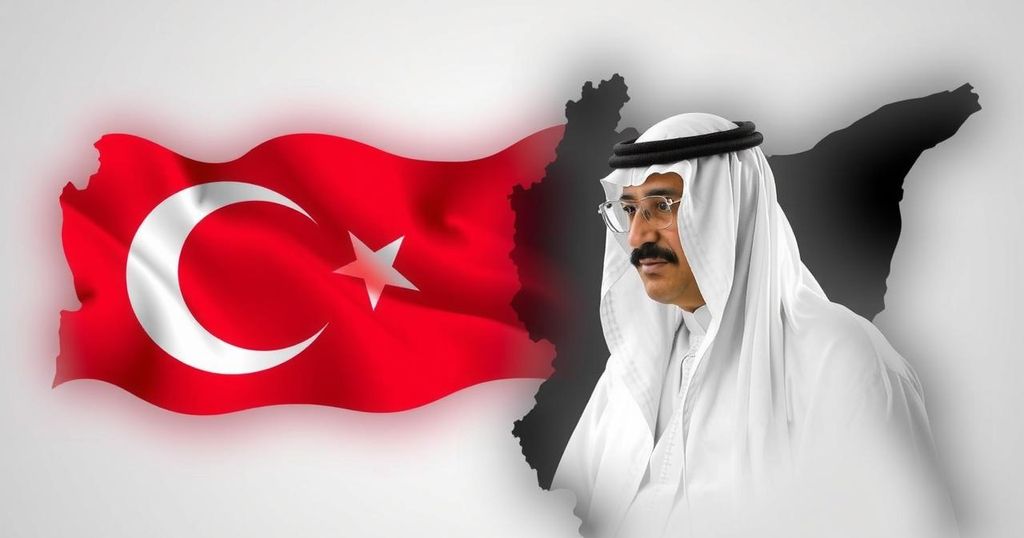Turkey Pursues Gulf Support for a New Syrian Governance Structure
Turkey is working with Saudi Arabia and the UAE to shape Syria’s future after Assad’s regime collapse. Turkish leaders are cautious to avoid past mistakes, seeking a neutral Syria through regional cooperation, particularly as they engage with HTS and address the role of Russia in reconstruction efforts.
Turkey is actively seeking the support of Saudi Arabia and the United Arab Emirates (UAE) to influence the future political landscape of Syria following the abrupt decline of Bashar al-Assad’s regime. Turkish officials are proceeding with caution, keen to avoid the pitfalls experienced during the Arab Spring, while also recognizing the importance of regional and international alliances for Syria’s stability, which is essential given the country’s population of 20 million. Turkey, led by President Recep Tayyip Erdogan, is particularly interested in Gulf nations’ backing due to their past reservations about groups like the Muslim Brotherhood.
The upcoming summit in Cairo, where Erdogan is to meet with Egyptian President Abdel Fattah el-Sisi, will focus on collaborative discussions regarding the new Syrian government. Sisi’s opposition to Islamist factions aligns with Turkey’s concerns about the rise of Hay’at Tahrir al-Sham (HTS) in Syria. Ankara wishes to exert influence over HTS, notwithstanding Turkey’s public denial of direct support for the group, which has played a critical role in overthrowing Assad’s forces in Damascus.
The communication from Turkish Foreign Minister Hakan Fidan indicates Turkey’s deep understanding of HTS dynamics. Reports suggest Erdogan has committed to military and logistical assistance to HTS to fortify stability within Syria. Furthermore, Fidan has engaged with a variety of international players, coordinating efforts to foster a government in Syria that is inclusive and respects the rights of women and minorities.
Turkey emphasizes the need for a neutral Syrian state that poses no threats, particularly regarding terrorism. This stance includes calls for Israel to cease air operations against Assad’s former military structures, asserting the need for mutual respect among neighboring states, and urging cooperation among regional powers to prevent any singular country from asserting dominance, namely, Iran or Turkey.
The shifting dynamics and discussions with Gulf nations signal a significant change, as various leaders, including from the UAE, begin to reconsider support for Syrian reconstruction, given its implications. Financial contributions from these Gulf nations and supportive involvement from western entities are essential for the reconstruction efforts in Syria’s future.
Despite progress, the involvement of Russia remains a concern, as they retain military basing rights in Syria, with some EU member states demanding their withdrawal as a condition for support of a new Syrian administration. Negotiations reportedly underway between Moscow and HTS could alter the operational landscape significantly, possibly resulting in HTS being removed from international terrorism lists, a move that could facilitate broader Russian engagement in Syria’s reconstruction.
The geopolitical landscape surrounding Syria has undergone significant changes following the rapid destabilization of President Bashar al-Assad’s regime. Turkey’s historical involvement and aspirations in Syria position it as a crucial actor in shaping the trajectory of the nation post-Assad. The need for stability is underscored by the substantial regional implications of the Syrian conflict on neighboring countries. Erdogan’s government is now focusing on collaborative partnerships with Gulf nations and negotiating with global powers to establish a principled and cohesive approach to governance in Syria. The background of strained relationships, particularly with groups like HTS and players like Russia, adds complexity to the situation, requiring careful diplomatic navigation.
In conclusion, Turkey’s proactive diplomatic engagements with Saudi Arabia and the UAE aim to establish a stable and neutral Syrian governance that aligns with regional interests while seeking to avoid the chaos of prior conflicts. By advocating for an inclusive government and navigating the complexities of relationships with both HTS and Russia, Turkey seeks to ensure that Syria emerges as a non-threatening neighbor. The ongoing collaboration with various regional and global actors underscores the necessity of joint efforts in supporting reconstruction and humanitarian needs in Syria.
Original Source: www.middleeasteye.net




Post Comment